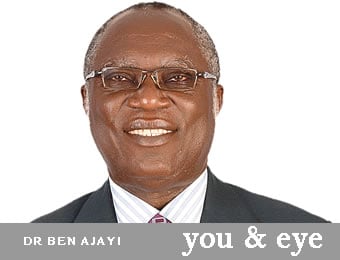“At the hint of a headache, I would take two tablets of paracetamol or APC. Then one day, I had a very bad headache. With an important examination on the next day, I took two tablets of paracetamol that night. This was followed, in the morning, as soon as I got up from my bed, by two tablets of APC.
“About 15 minutes later, I had an intense abdominal cramp and started to vomit. I vomited bright red blood! I was scared! My friends rushed me to the university clinic just in time before I passed out! I spent one week in the hospital and had two pints of blood.
“The doctor told me that the “A” in APC was Aspirin and had eroded the lining of my stomach and blood vessels. He chided me for taking Aspirin on empty stomach. “You are lucky to be alive,” he had told me. Now, I play safe. Whatever the medicine, I would only use after meals.”
Chief was indeed very lucky to be alive. He was also fortunate to have his sight! He had been using chloroquine excessively and would have gone blind had he not been admitted into the hospital and the abuse of the medicine detected in good time. Many are not so lucky and are irreversibly blind from excessive use of chloroquine.
After the sad experience, Chief has now gone completely to the other side. He would use all medicines including eye drops only after meals! There are several negative implications of his ridiculous position. It meant he would ignore his doctor’s orders. In special instances, a doctor may ask a patient to use a drug that is supposed to be used after meals before meals.
There are several important considerations in taking a decision to use a medicine before or after meals. First are the characteristics of the medicine. Is it corrosive and likely to damage the lining of the stomach such as aspirin? Is it better absorbed with food in the stomach or on an empty stomach?
The contents of a full stomach may interfere with the absorption and consequently the effectiveness of some medicines. The acidity in the stomach may alter the nature of the medicine thus retarding its absorption and its effectiveness.
Some antibiotics are better taken on empty stomach whilst some would be more effective if taken on a full stomach. I had a personal experience with one of the newer brands of anti-malarial medicines. It had very little or no effect on me whenever I took it and I would have to add some other medicines to cure malaria. When I related this to a colleague, he smiled and said, “I am sure you took it on an empty stomach, try taking it after a full meal.” I did and since then it has always worked for me.
Dele, a member of the United for Vision Club wanted to know if some eye drops are really more effective at some hours of the day? “Yes, some eye drops have been found to be more effective when used at night. Some have also been found to have certain negative effects in some people if used late in the evening.
Always make it a point of duty to ask your doctor. Sometimes there may be a conflict between the instructions your doctor has given you and what the manufacturer’s leaflet says. What to do is to confront your doctor with your findings and seek his opinion. He may have special reasons for not conforming. Don’t just follow the manufacturer’s instructions. And don’t be like a “zombie” too! Remember, however, that the manufacturer does not know you; he has no personal knowledge of your ailment, but your doctor does!
Finally, always use your medicines as prescribed. A medicine that is supposed to be used four times a day must not be used twice a day. In between dosages, a lot of damage is done. For some medicines such as those for glaucoma, it is like not using anything. Your doctor has the last say on the right time to use your medicine.
Why you must use your medicines as prescribed





